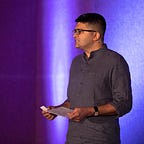A Tip to Ace Group Discussions
Remember Madhuri Dixit
Along with personal interview, a crucial part of the selection process for higher studies at prestigious institutions and for landing good jobs at the best companies, is the Group Discussion (GD) round. Seeming easy, it can rattle the best prepared candidates. People speak out of turn, shout, try to hog attention, it becomes difficult to make sense and reach a consensus leading to complete chaos. The topics given are such that some of the participants will have one viewpoint while others will lean toward the opposite extreme. Very soon it becomes nothing but a cacophony, bringing with it the risk of elimination for all participants in that GD group.
Let me share a tip to prevent this scenario, one that helps you form an independent opinion that makes an impression, allows your voice to be heard and valued by fellow interviewees as well as the interviewers. Allow me to take you on a short journey to the Antaragni inter-college festival of IIT Kanpur. The year was 1998. As a member of the participating team representing my college, I too was there at IIT’K campus.
The part we would focus on happened during the final round of the Miss Antaragni competition. In the final round, three contestants stood on stage and they were asked a question. The 1990s was a time when Madhuri Dixit was the queen bee of Bollywood. At one point she was so popular that comparisons began to be drawn between her and Amitabh Bachchan, with film critics according her a status equal to or greater than most of her male co-stars. During this time, there appeared an article in a newspaper titled — “Madhuri de do, Kashmir le lo”. This was written in jest, meant to give no offence to anyone, nor intending to demean and undermine the seriousness of the Kashmir issue. Premised on the immense popularity and large fan base that Madhuri enjoyed in India and across the border in Pakistan, the author presented a hypothetical scenario where the then Pakistani PM Nawaz Sharif is addressing his Indian counterpart and offering to settle the Kashmir issue in exchange for Madhuri Dixit crossing over to Pakistan.
Remember this was the 1990s, before the Kargil misadventure. India and Pakistan had not fought an open war for over 25 years, there was a lot of cultural interaction and bilateral sporting events between the two nations were a regular feature. Of course, the 1990s also witnessed large scale terrorist activity in Jammu and Kashmir state of India, most of it overtly or covertly sponsored by Pakistan. Yet, those were simpler times before the advent of the hyper nationalist era, bordering on jingoism, fostered by social media platforms that we witness today.
Anyways, with this article as the background, the judges posed their last question to the three finalists of Miss Antaragni 1998. It went like this — “If you were Nawaz Sharif, what would be more important to you — Madhuri or Kashmir, and why?” It was a tricky either-or question; take any side and you expose yourself to more uncomfortable questions, landing squarely in the crosshairs of the judges who disagreed with your view.
In the time allotted to the participants, most of us in the audience were thinking up our own answers, the majority making up their mind that definitely Kashmir was far more important — one individual, howsoever popular or important could never exceed in value the people, resources and sentimental value attached to an entire state. It didn’t seem like a logical comparison. Besides, Kashmir has always been a sensitive topic and people were bound to be touchy about it. On the other hand, if the answer has been that one sided, this could not have been the final question to choose the title winner.
We waited with bated breath as to how the three contestants would respond. Predictably, the first one answered it would be Kashmir, the next said it would be Madhuri, both coming up with reasonable justifications for why they thought so. I was left wondering as to what the third participant, the one I had been rooting for since the first round, would say. Since both the answers had already been offered, she was not left with much choice, at most she could come up with a stronger argument for her case.
What she said that evening not only won her the Miss Antaragni title, but also offered brilliant advice on how to handle difficult questions when there are no correct or right answers. She said, “to Nawaz Sharif the man, Madhuri Dixit may be more important; but to Nawaz Sharif the Prime Minister of Pakistan, Kashmir would be far more important.” It was simple, balanced, brilliantly articulated, short and to the point. I doubt if I can ever frame a better reply.
As it is, group discussion topics are frequently of a similar type where there are no clear-cut or ready answers. Any topic assigned, is bound to have both pros and cons. It is best to look at it from all possible angles, develop a 360-degree perspective, then calmly and firmly share your viewpoint without bias or excessively leaning towards any one side.
Next time you are preparing for an interview, before facing the GD, if you really want to do well, this is what you should do - always remember Madhuri Dixit. And thank her.
Good luck.
